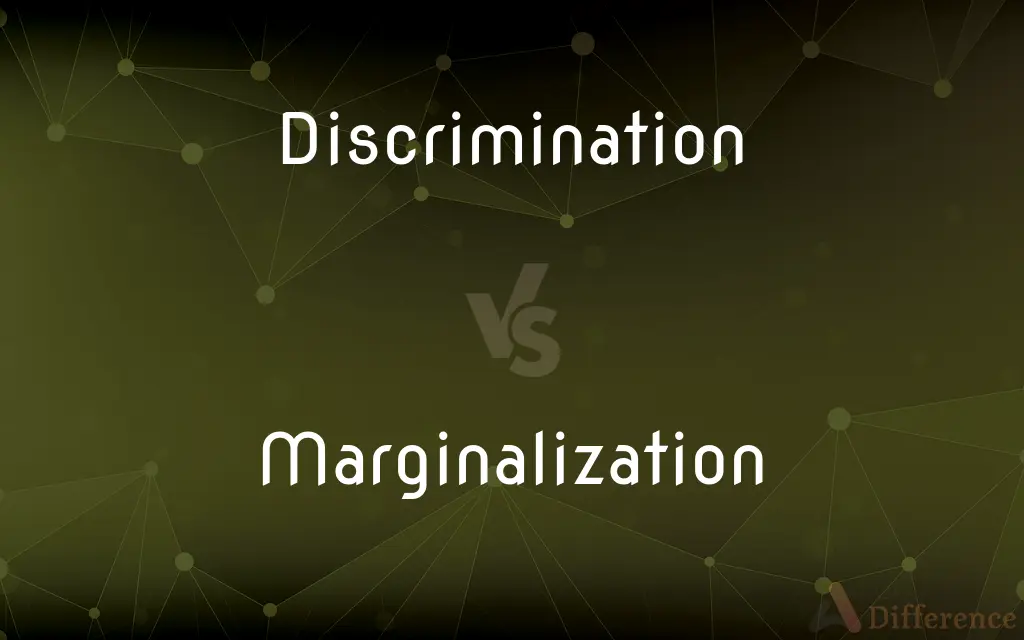Discrimination vs. Marginalization — What's the Difference?
By Urooj Arif & Maham Liaqat — Updated on March 9, 2024
Discrimination involves unfair treatment based on personal characteristics, whereas marginalization is the relegation of a group to a lower social standing.

Difference Between Discrimination and Marginalization
Table of Contents
ADVERTISEMENT
Key Differences
Discrimination is an act or a series of acts that result in unequal treatment of individuals or groups based on inherent characteristics such as race, gender, or age. This can manifest in various spheres of life, including employment, education, and access to services. Marginalization, on the other hand, is a broader process that not only includes discrimination but also encompasses the systemic exclusion of a group from meaningful participation in society.
While discrimination can be seen as a cause of marginalization, marginalization reflects a state or condition resulting from prolonged discrimination and social exclusion. Discrimination might be more easily identified through specific incidents or policies, whereas marginalization is often a more insidious and pervasive condition that affects a group's overall status and opportunities in society.
Discrimination often stems from prejudice and biases against certain characteristics of individuals or groups. Marginalization, however, goes beyond prejudice to include economic, social, and political exclusion. It's a form of systemic oppression that can affect generations, limiting access to education, resources, and power.
An individual can experience discrimination directly through acts of prejudice or bias. In contrast, marginalization is experienced by groups and is reflected in the systemic denial of access to opportunities, resources, and rights that are otherwise available to more privileged groups within society.
Addressing discrimination might involve legal and policy changes to ensure equal treatment and opportunities. Tackling marginalization requires more comprehensive approaches that address the underlying social, economic, and political structures that perpetuate inequality and exclusion.
ADVERTISEMENT
Comparison Chart
Definition
Unfair treatment based on inherent characteristics
Systemic exclusion from meaningful societal participation
Scope
Individual or group acts
Broad societal processes
Causes
Prejudice, biases
Economic, social, and political exclusion
Manifestation
Specific incidents, policies
Pervasive condition affecting opportunities and status
Experience
Directly through acts of prejudice
Systemically, affecting groups over time
Addressing the Issue
Legal and policy changes for equality
Comprehensive societal restructuring
Compare with Definitions
Discrimination
Unjust treatment of different categories of people, especially on the grounds of race, age, or gender.
Refusing someone a job because of their gender is a clear case of discrimination.
Marginalization
Relegation of a group to the outskirts of society.
Marginalization of indigenous communities limits their access to healthcare and education.
Discrimination
Legal and social frameworks can perpetuate discrimination.
Laws that restrict voting rights based on discriminatory practices.
Marginalization
Economic and social processes that exclude groups from participation.
Economic marginalization can result from persistent unemployment.
Discrimination
Discrimination affects both individuals and groups, leading to unequal access to resources and opportunities.
Racial discrimination affects housing, education, and employment opportunities.
Marginalization
Comprehensive measures are required to address marginalization.
Policies aimed at social inclusion and equity can help reduce marginalization.
Discrimination
Discrimination can be overt or subtle in its manifestations.
Subtle discrimination might include microaggressions in the workplace.
Marginalization
Political marginalization affects a group’s power and representation.
Marginalized communities often have less political influence and access to justice.
Discrimination
Actions based on prejudice that deny individuals opportunities.
Discrimination in hiring practices can prevent qualified candidates from getting jobs.
Marginalization
Marginalization can lead to a cycle of poverty and exclusion.
Marginalized groups may have limited access to quality education, perpetuating the cycle of poverty.
Discrimination
Recognition and understanding of the difference between one thing and another
Discrimination between right and wrong
Young children have difficulties in making fine discriminations
Marginalization
To relegate or confine to a lower or outer limit or edge, as of social standing.
Discrimination
The selection of a signal having a required characteristic, such as frequency or amplitude, by means of a discriminator.
Marginalization
The act of marginalizing or something marginalized.
Discrimination
The act of discriminating.
Marginalization
The social process of becoming or being made marginal (especially as a group within the larger society);
The marginalization of the underclass
The marginalization of literature
Discrimination
The ability or power to see or make fine distinctions; discernment.
Discrimination
Treatment or consideration based on class or category, such as race or gender, rather than individual merit; partiality or prejudice.
Discrimination
Discernment, the act of discriminating, discerning, distinguishing, noting or perceiving differences between things, with the intent to understand rightly and make correct decisions.
Discrimination
(uncountable) The quality of being discriminating; acute discernment, especially in matters of good taste.
Discrimination
That which discriminates; a distinguishing mark, a characteristic.
Discrimination
The act of discriminating, distinguishing, or noting and marking differences.
To make an anxious discrimination between the miracle absolute and providential.
Discrimination
The state of being discriminated, distinguished, or set apart.
Discrimination
The arbitrary imposition of unequal tariffs for substantially the same service.
A difference in rates, not based upon any corresponding difference in cost, constitutes a case of discrimination.
Discrimination
The quality of being discriminating; faculty of nicely distinguishing; acute discernment; as, to show great discrimination in the choice of means.
Discrimination
That which discriminates; mark of distinction.
Discrimination
Unfair treatment of a person or group on the basis of prejudice
Discrimination
The cognitive process whereby two or more stimuli are distinguished
Common Curiosities
How do discrimination and marginalization relate to each other?
Discrimination can lead to marginalization by perpetuating unequal treatment and exclusion from societal participation, thereby reinforcing systemic barriers.
What are some common effects of marginalization?
Common effects include reduced access to education, employment, healthcare, and political representation, leading to economic and social disparities.
Can someone be marginalized without being directly discriminated against?
Yes, individuals or groups can be marginalized through systemic barriers that limit their opportunities and access to resources, even in the absence of direct discrimination.
What is the difference between discrimination and marginalization?
Discrimination is the act of treating individuals or groups unfairly based on their characteristics, while marginalization is a broader process of systemic exclusion from societal participation.
Are there global efforts to address marginalization?
Yes, international organizations and treaties aim to promote human rights and equality, advocating for measures to address marginalization and discrimination worldwide.
Can marginalization occur within marginalized groups?
Yes, intersecting identities can lead to further marginalization within already marginalized groups, such as discrimination based on gender, or disability within a racial or ethnic minority.
How does cultural representation relate to marginalization?
Representation in media, politics, and other areas of public life is vital for challenging stereotypes and promoting inclusion, thereby combating marginalization.
How can discrimination and marginalization be addressed?
Addressing these issues requires legal reforms, policies promoting equality and inclusion, and societal efforts to change prejudicial attitudes and dismantle systemic barriers.
Is marginalization only a social issue?
While it's primarily a social issue, marginalization also encompasses economic and political dimensions, affecting virtually all aspects of life for those impacted.
What role does education play in combating discrimination and marginalization?
Education is crucial for raising awareness, fostering understanding and tolerance, and equipping individuals with the knowledge to challenge and change discriminatory practices and systemic barriers.
Share Your Discovery

Previous Comparison
Swag vs. Schwag
Next Comparison
Plasmolysis vs. CytolysisAuthor Spotlight
Written by
Urooj ArifUrooj is a skilled content writer at Ask Difference, known for her exceptional ability to simplify complex topics into engaging and informative content. With a passion for research and a flair for clear, concise writing, she consistently delivers articles that resonate with our diverse audience.
Co-written by
Maham Liaqat













































